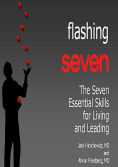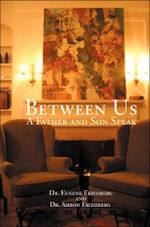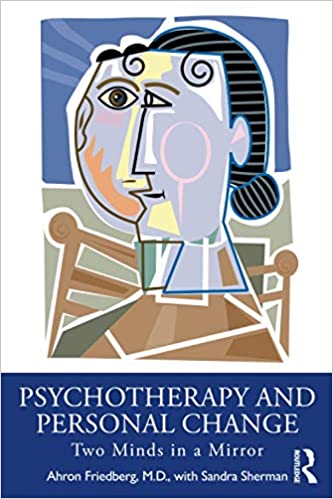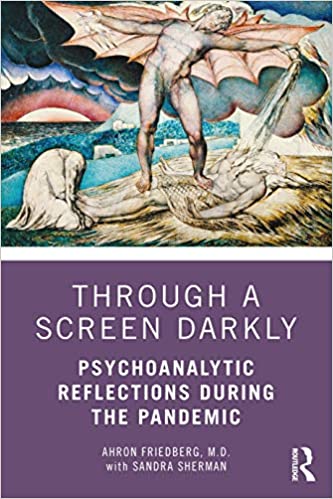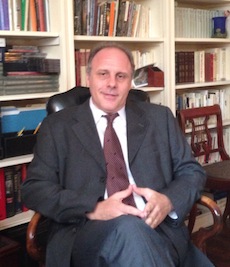Peer Reviewed Original Contributions
Ahron Friedberg, “Desire On and Off the Couch,” American Journal of Psychoanalysis, 2013, 73, (62–81).
Michael Brus, Vladan Novakovic, Ahron Friedberg, “Psychotherapy for Schizophrenia: A Review of Modalities and Their Evidence Base,” Psychodynamic Psychiatry, Psychodynamic Psychiatry: Vol. 40, No. 4, pp. 609-616.
Ahron Friedberg and Louis Linn, “The Couch as Icon,” The Psychoanalytic Review, Volume 99, Issue 1, Page 35-62, February 2012.
J.S. Hammer, J.J. Strain, A.L. Friedberg, “Operationalizing a Bedside Pen Entry Notebook Clinical Database System in C-L Psychiatry,” General Hospital Psychiatry May 1995.
R.M. Blaese, D. Kohn, K. Culver, A. Friedberg, “Gene Transfer for Therapy of Hematologic Diseases,” Contemporary Issues in Pediatric Transfer Medicine , 1988.
A. Friedberg, “A Hand and a Name,” British Medical Journal, 22-29, December 1984, 289, 1745-1746.
Books
Flashing Seven: The Seven Essential Skills for Living and Leading
by Ahron Friedberg
Flashing Seven addresses the question of how a person can best live and lead his or her life. Dr. Friedberg takes an approach based in learning and developing seven essential skills to achieve excellence in your chosen path. Each skill is playfully labeled as a “ball” because a main metaphor of the book is juggling–keeping your balls in the air.
“Flashing Seven is an essential book for all of us who are interested in leading our best life. It teaches the necessary skills to overcome adversity and to fulfill your potential. These practices include keeping perspective and prioritizing, learning continuously, taking care, openness to new ideas, building relationships, and modeling and mentoring. Drs. Hirschowitz and Friedberg are masters at empowering you in leading your life.” – David Dembitzer, Partner, Dembitzer & Dembitzer, LLP
“Flashing Seven is a unique work melding the tradition of Stephen Covey’s 7 Habits of Highly Effective People with Scott Peck’s classic The Road Less Traveled. The authors are leading psychiatrists and expert in leadership coaching. They instruct by way of example, professionally and personally. Their life lessons will help you keep all your balls in the air–and even add a few more. In these times, we are in great need of effective leadership. This gem of a book shows us the way.” – James Strain, MD, Professor of Psychiatry, Mount Sinai Medical Center
Between Us: A Father and Son Speak
by Ahron Friedberg
Between Us is on the shortlist of essentials to take along the trails of life’s journey. It is both an exhilarating and profound work, based on a remarkable series of conversations between a wise and loving father and a witty and inquisitive son. Together they speak to each of us as individuals relating to one another-parent and child, teacher and student, peers learning mutually. Their discussions embody a deep humanity and understanding.
In searching out ways of leading a happier life, Between Us helps each of us to learn and grow. It heartens as it teaches, reaffirming how through a commitment to self-awareness and applying that knowledge, a person can clearly improve his or her life. Its emphasis on the basics-work, love, marriage, family and the like-provides an approach for living richly and fully here and now. This unique dialogue shows and tells how loving relationships sustain us and make for a more meaningful life. Its lessons are invaluable.
Psychotherapy and Personal Change: Two Minds in a Mirror
by Ahron Friedberg
Psychotherapy and Personal Change: Two Minds in a Mirror offers unique day-to-day accounts of patients undergoing psychotherapy and what happens during “talk therapy” to startle the complacent, conscious mind and expose the unconscious. It is a candid, moment-by-moment revelation of how the therapist’s own memories, feelings, and doubts are often as much a factor in the process as those of the patient.
In the process of healing, both the therapist and the patient reflect on each other and on themselves. As the therapist develops empathy for the patient, and the patient develops trust in the therapist, their shared memories, feelings, and associations interact and entwine – almost kaleidoscopically – causing each to ask questions of the other and themselves. In this book, Dr. Friedberg reveals personal insights that arose as he recalled memories to share with patients. These insights might not have arisen but for the therapy, which operates in multiple directions as patient and therapist explore the present, the past, and the unknown. Readers will see the therapist – like the patient – as a complex, vulnerable human being influenced by parents, colleagues, and friends, whose conscious and unconscious minds ramify through each other. It is a truism of psychotherapy that in order to commit to the process, whatever the reservations or misconceptions, one must understand that therapy is not passive. The patient must expect to become personally involved with the therapist. The patient learns about the therapist even as the therapist helps the patient to gain insight into him- or herself. Psychotherapy and Personal Change shows how this exchange develops and how each actor is affected.
Through specific examples, the book raises the reader’s understanding of what to expect from psychotherapy and enhances his/her insight into therapy that he or she may have had already.
Through a Screen Darkly: Psychoanalytic Reflections During the Pandemic
by Ahron Friedberg
Through a Screen Darkly identifies the psychological distress caused by the pandemic, examining how the particular elements of COVID-19 – its ability to be spread by those who seem not to have it, its intractability, the long-term uncertainty that it engenders – leave even relatively stable people shaken and unsure of the future. The book examines how, amidst radical uncertainty and the prospect of massive social change, such people learn to become resilient. The main theme of the book is that, of necessity, we learn to adapt. Though we still can only see “darkly,” we can call on the resources that we have, as well as those we can reasonably acquire, so as to retain a sense of our dignity and purpose. Through a Screen Darkly examines what is possible now as the pandemic runs its course. It makes no predictions of how all this will ultimately play out, but offers a time capsule of how people have coped with a disease that landed suddenly and that we still do not fully understand.
Offering a series of intense encounters with worried, traumatized people, this book will be invaluable to in-training and practicing psychiatrists, as it points to the several possible directions for our national, psychological recovery from the pandemic.

